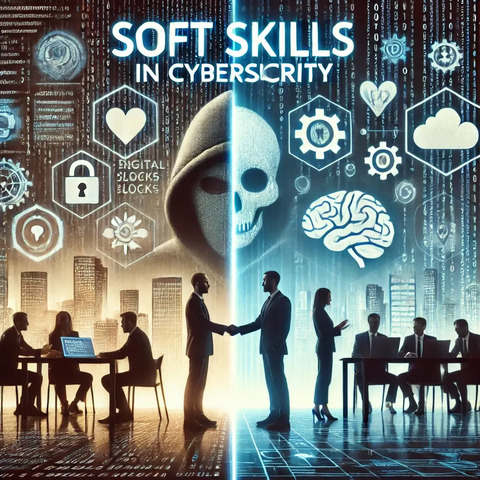Why Soft Skills Matter in Cybersecurity & How to Develop Them

When people hear the word cybersecurity, they usually think of computer experts stopping hackers, using fancy tools, and typing code all day. And yes, technical knowledge is super important. But here’s a secret:
Cybersecurity is not just about computers. It’s also about people.
If you want to protect a company from cyber attacks, you can’t just be good with technology—you also need to be good at working with others, explaining things clearly, solving problems calmly, and being a good team player.
These are called soft skills.
Let’s break down why soft skills matter in cybersecurity, with real-life examples, and then we’ll look at how you can improve them.
What Are Soft Skills?
Soft skills are things like:
- Talking and listening well (communication)
- Solving problems (critical thinking)
- Working well in a group (teamwork)
- Understanding people’s feelings (emotional intelligence)
- Leading others (leadership)
You might not learn these in a coding class, but they are just as important in a cybersecurity job.
Why Soft Skills Are Important in Cybersecurity
1. Cybersecurity is Mostly About People
Most cyber attacks happen because of people, not because of machines. For example:
- Someone clicks a fake email link (called phishing)
- An employee uses a weak password
- Someone makes a mistake and leaks information
In fact, a big report by Verizon in 2023 said that 74% of data breaches involve human error in some way. That’s huge!
To stop these kinds of problems, security experts need to talk to people, train them, and explain how to stay safe.
2. You Need to Explain Tech to Non-Tech People
Imagine you’re a cybersecurity expert, and you find a serious problem in the company’s system. You need to tell your boss and the legal team. But they’re not tech experts.
If you say:
“There’s a zero-day exploit with privilege escalation risk via misconfigured IAM roles,”
They might stare at you like you’re speaking Martian.
Instead, you can say:
“There’s a hidden bug in our system that could let someone sneak in and get control. It’s like someone finding a secret key to our building.”
That’s communication. And it’s a soft skill.
3. You Need to Solve Problems and Think Clearly
Every day, cybersecurity workers get a bunch of alerts and warnings. Some are real threats. Some are false alarms. If you panic every time or block every user, you’ll waste time and annoy people.
You need to:
- Look at the details
- Ask smart questions
- Think logically
That’s called critical thinking. It helps you respond to real problems quickly—and ignore the noise.
4. Teamwork Is Key
Cybersecurity is never a one-person job.
You work with:
- IT (tech support)
- HR (when someone leaves or gets hired)
- Developers (who build apps)
- Legal and PR (if there’s a breach)
If everyone works in their own bubble, things break down. But if you collaborate, you can stop problems before they start.
During the 2017 WannaCry ransomware attack, some companies bounced back quickly because their teams worked together like a well-oiled machine. Others didn’t—and paid the price.
5. Emotional Intelligence Helps During Stressful Times
Imagine a developer is upset because you’re making them change their process for security reasons. If you snap back, you make it worse.
But if you say:
“I understand this is frustrating. Let’s work together to find a way that keeps things secure and smooth for your team,”
That’s emotional intelligence—knowing how to manage your emotions and understand others. It helps you build better relationships and avoid drama.
6. Great Cybersecurity Pros Are Also Great Leaders
A cybersecurity leader doesn’t just fix problems—they guide the whole company to make better security decisions.
If your company wants to move to “Zero Trust” (a way of making systems extra secure), it’ll take:
- Convincing people to change
- Helping them learn new tools
- Showing them why it matters
A strong leader can inspire and support others through that process.
How Can You Build These Soft Skills?
You don’t need to be born with soft skills. You can learn them! Here’s how:
1. Listen More
When someone talks, really pay attention. Don’t interrupt. Don’t assume. Repeat what they said in your own words to make sure you understood.
Example:
“So, you’re saying the new update caused issues with the app? Got it—thanks for explaining.”
2. Join Teams with Non-Tech People
If you only work with other security folks, you’ll never get better at explaining things to others. So try joining:
- Project groups with legal or HR
- Training sessions with marketing
- Cross-department task forces
3. Take Soft Skills Courses
There are tons of online classes on:
- Communication
- Leadership
- Conflict resolution
- Emotional intelligence
Try LinkedIn Learning, Coursera, or Udemy. You’ll be surprised how helpful they are.
4. Ask for Feedback
After a presentation or meeting, ask:
“Was that clear?”
“Anything I could explain better?”
“Did that make sense to you?”
It shows you care and helps you improve.
5. Practice Real-Life Scenarios
Try:
- Running a fake security incident with your team (called a tabletop exercise)
- Acting as the leader in a drill
- Practicing how you’d explain a breach to the CEO
These practice runs build confidence and real skill.
Final Thoughts: The Best Cybersecurity People Are Great Communicators Too
The world needs cybersecurity experts who can:
- Understand threats
- Solve problems
- Work with people
- Lead teams
- Keep calm under pressure
Yes, technical skills are vital. But soft skills are what turn a “good” cybersecurity pro into a great one.
So if you’re working in security, or dreaming of it—don’t just learn how to hack or configure firewalls.
Learn how to listen, talk, lead, and think.
Because at the heart of cybersecurity isn’t just code—it’s communication, teamwork, and trust.
Quick Recap:
- Most breaches happen because of human mistakes.
- Soft skills help you explain problems, solve them, and work well with others.
- You can improve soft skills through listening, teamwork, training, and practice.
Let’s make cybersecurity about people—not just passwords.




